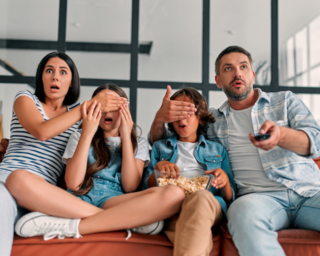Media
What to Tell our Children About the Breach of Capitol Hill
Parents can use this opportunity to teach about democracy and respect.
Posted January 9, 2021 Reviewed by Kaja Perina

The last couple of days we have seen adults gripped to their television. The intense highs and lows have made people obsessive. The violence seen on the media by children can be very scary for them, but even scarier is seeing their parents gripped by emotion by these disturbing events.
I have two children, ages 8 and 10. I am well aware they need my help filtering this scary news through the lens of a mature adult, turning these things into teaching moments, and in the process also sharing our values. It is important for me to tell them how violence is never the answer, and that a democracy depends on voters and their decisions. It is also important in learning how to accept defeat whether in school, while playing sports, and in general throughout their lives. Peaceful transitions of power are necessary to democracies and the people who stormed the Capitol were wrong.
We also need to understand that it is important we model good behavior for our children and not obsessively watch the news. Right now, this might be hard. Why?
There is a theory about repetitive behavior called reward prediction error. This is the difference between the reward we predict and the reward we get. If you get more reward than you predict, such as a jackpot in slots, or someone likes your social media photo, you feel a sense of euphoria. And you feel the opposite when it does not happen.
The current news cycle is a lot like gambling. It is a constantly varying schedule, and you never know when the new burst of information will come in. As B.F. Skinner predicted, it creates the most intense change in our behavior and makes checking our phones habitual. This is not so different from what social media companies use to change our behavior so we constantly use our social media, as seen in the film Social Dilemma.
This whole Trump-Biden transition news cycle has us neurochemically swinging from up to down. It has our kids watching our emotions and confused by it all. It is important to validate your feelings and those of your children. When my children saw me shocked and mad, I did not dismiss my feelings. Instead I said,
“Yes I am angry right now, but I am going to be okay. Emotions are like a wave. They go up and down, and they will pass. You don't need to worry about me, as I am an adult that can understand that some people can make bad choices. I believe in this country and its power to heal.”
How do we mitigate the influences which may affect our children's emotions? And how do they process these uncertain events?
The answer to this question requires a bit more analysis and varies, depending on the age and comprehension of the child. It is important to meet the child at their level of understanding, address this topic in a calm manner, and explain there are bad things that happen, and the attack on the Capitol was a bad thing, and it was scary.
Starting with the younger age group, talk about “good and bad ideas” instead of “good and bad people.” Belonging, subscribing, or agreeing to different viewpoints does not make you enemies.
Talking with older children or teenagers who can understand the basics of politics will require more information. Parents will be able to explain democracy and how people have different opinions, and sometimes when people get emotional about their opinions and they can go too far. Examples they may understand are things like lying, or when one kid pushes another on the playground.
Educate children. Just because we see politicians getting nasty with each other on TV and social media, that does not define who we are as a country or how we are as a family. Explain that politicians may disagree, but they should never insult one another.
Give them an example from their own life so they can relate. For example, “Just like you may disagree with another kid at school, that does not mean that you should insult them. Instead, talk to them and figure out where they are coming from, and why they might feel the way they do.” This is an opportunity to teach them about debating your perspective and how you should try to listen and be respectful of the other person.
Here are some effective ways parents can approach the discussion of politics with children:
How can parents teach their kids to think critically when they feel passionately?
Communication skills are key. Stick to “I think” and “I feel” statements to avoid the use of “you.” Take a break from the conversation if you feel your body temperature rising and take a deep breath. I like using square breathing even when things get heated at the dinner table: Five seconds in, hold for five seconds, five seconds out, and hold for five seconds. Any discussion can go negative if you are in an emotional state.
What are some ways to teach kids how to distinguish between a constructive and an ugly/disrespectful debate?
You know the debate is getting ugly or disrespectful when someone starts insulting the other person’s character and family. Explain to them that different people can have different points of view and there can be more than one point of view that is valuable.
Teach them that no matter what the other person’s point of view may be, you should not take it personally, even if they insult you. Sometimes emotions get in the way of clear thinking and make people say things they do not really mean. Usually, they will come back to it later and apologize. The more upset you get, the more it will escalate the discussion and drive you further away from a mutual understanding.
How can parents’ model open understanding and compassion in the context of a political debate?
Parents should debate political things to some degree, but remember to keep their voices down, listen to each other’s perspectives, and always look for the nugget you agree with and compliment it. Then you can address the nugget you do not agree with, because “a spoonful of sugar helps the medicine go down.” In other words, share the good and the bad. This will model great communication skills and show that complicated discussions can go well and do not have to resort to negativity and personal insults.
What should parents be teaching their kids about how to manage political talk/fights/criticism on social media?
One way is to not do it because political debates on social media can get ugly. If you feel like you want to allow it as a parent, you have to monitor it and make sure it’s not getting personal or ugly. Social media should be about sharing photos from your prom, not political debates. Surrounding yourself with negativity will breed anxiety and depression in you and your children. Make a choice about how much time you want to spend in this negative headspace.
How should parents share their opinions while also teaching kids to think for themselves?
You can say, “This is my opinion,” and also share the other side of the debate and explain why you do not agree with it. Tell them that one day, they will be able to decide for themselves.
How can parents teach kids to focus on productive action rather than negative spiraling/extreme responses (e.g., “Let’s just lock them all up”)?
Work on how parents communicate, finding the pearl in every statement. Try reflective listening, which means reflecting on what the other person said, as this shows that you are taking the other person seriously. For example, a person may say, “I think that Donald Trump should be put in jail.” If you disagree, you can say, “I understand that Donald Trump might have made mistakes, but he has still done some good things.” This reflects back the original statement someone made and shows you were listening.
Again, stick to “I think” and “I feel” statements to avoid the use of “you.” When you feel heated, remember to take a break and let your body temperature go down before you come back to the discussion. If it is getting ugly, and people are talking over each other, then you can play the “pass the ball” game. This is where only the person with the ball can speak, so other people are not interrupting. This is great for gatherings with extended families.
As parents, let’s model good behavior and raise politically conscious citizens. Show them that conflict can be handled through communication and listening. Learn to stay calm emotionally. Most importantly, understand when to put down our phones and shut off the TV because our kids are watching.




